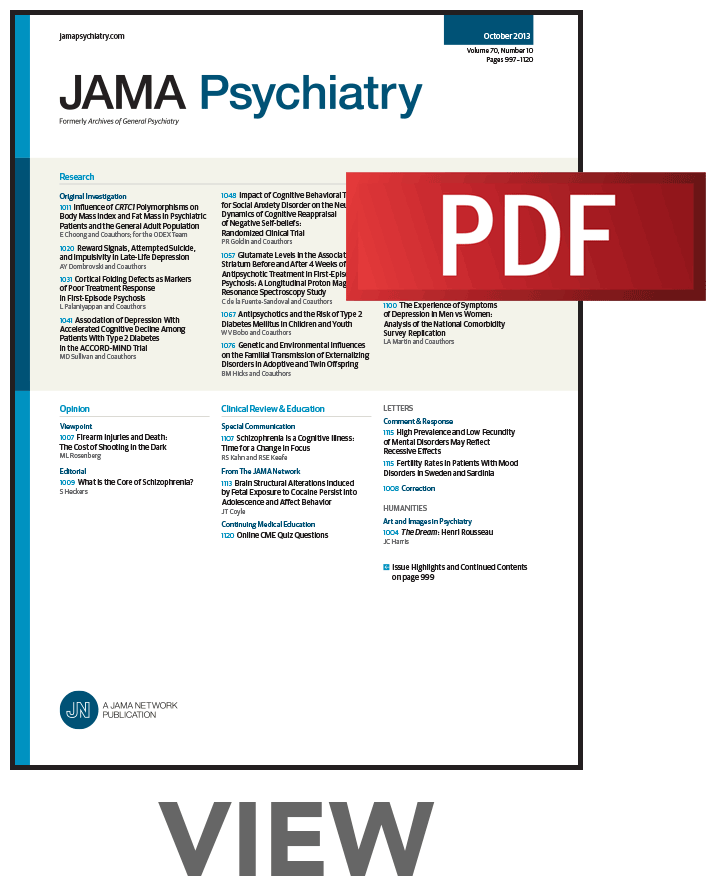创伤后应激障碍中的布雷克普拉唑和舍曲林联合疗法
IF 22.5
1区 医学
Q1 PSYCHIATRY
引用次数: 0
摘要
创伤后应激障碍(PTSD)需要新的药物治疗方案。目的探讨布雷派拉唑与舍曲林联合治疗PTSD(布雷派拉唑+舍曲林)与舍曲林+安慰剂的疗效、安全性和耐受性。设计、环境和参与者这是一项平行设计、双盲、随机临床试验,于2019年10月至2023年8月进行。该研究在美国86个临床试验点进行了为期1周的安慰剂磨合期,随后是11周的双盲、随机、主动对照、平行组期(21天随访)。入选PTSD成年门诊患者(志愿者样本)。介入治疗:口服brexpiprazole 2 - 3mg /天(灵活剂量)+舍曲林150mg /天或舍曲林150mg /天+安慰剂(1:1比例),持续11周。主要结局和测量:主要终点是布雷哌唑+舍曲林与舍曲林+安慰剂的临床应用PTSD量表DSM-5 (CAPS-5)总分(衡量20种PTSD症状的严重程度)从随机化(第1周)到第10周的变化。安全性评估包括不良事件。结果共有1327人入选。878次筛查失败后,416名参与者(平均[SD]年龄37.4[11.9]岁;女性310例(74.5%)。brexpiprazole +舍曲林组的完成率为214名受试者中的137名(64.0%),舍曲林+安慰剂组的完成率为202名受试者中的113名(55.9%)。在第10周,brexpiprazole +舍曲林对CAPS-5总分的改善有统计学意义(随机化时的平均值[SD]为38.4 [7.2];LS平均值[SE]变化,−19.2 [1.2];N = 148)比舍曲林+安慰剂(随机化,38.7 [7.8];变化,−13.6 [1.2];n = 134), LS平均差为−5.59 (95% CI,−8.79 ~−2.38;P, amp;肝移植;措施)。所有关键的次要和其他疗效终点也得到满足。brexpiprazole +舍曲林组(舍曲林+安慰剂组)治疗后出现的不良事件发生率为5%及以上的不良事件有恶心(205例中有25例[12.2%],196例中有23例[11.7%])、疲劳(205例中有14例[6.8%],196例中有8例[4.1%])、体重增加(205例中有12例[5.9%],196例中有3例[1.5%])、嗜睡(205例中有11例[5.4%],196例中有5例[2.6%])。205名受试者中brexpiprazole +舍曲林的不良事件停药率为8人(3.9%),196名受试者中舍曲林+安慰剂的不良事件停药率为20人(10.2%)。结论及相关性本随机临床试验结果显示,布雷哌唑+舍曲林联合治疗与舍曲林+安慰剂相比,能显著改善PTSD症状,具有统计学意义,提示布雷哌唑+舍曲林联合治疗可能是一种新的有效治疗PTSD的方法。Brexpiprazole +舍曲林被大多数参与者耐受,其安全性与Brexpiprazole在批准适应症中的安全性一致。临床试验注册号:NCT04124614本文章由计算机程序翻译,如有差异,请以英文原文为准。
Brexpiprazole and Sertraline Combination Treatment in Posttraumatic Stress Disorder
ImportanceNew pharmacotherapy options are needed for posttraumatic stress disorder (PTSD).ObjectiveTo investigate the efficacy, safety, and tolerability of brexpiprazole and sertraline combination treatment (brexpiprazole + sertraline) compared with sertraline + placebo for PTSD.Design, Setting, and ParticipantsThis was a parallel-design, double-blind, randomized clinical trial conducted from October 2019 to August 2023. The study had a 1-week, placebo run-in period followed by an 11-week, double-blind, randomized, active-controlled, parallel-arm period (with 21-day follow-up) and took place at 86 clinical trial sites in the US. Adult outpatients with PTSD were enrolled (volunteer sample).InterventionsOral brexpiprazole 2 to 3 mg per day (flexible dose) + sertraline 150 mg per day or sertraline 150 mg per day + placebo (1:1 ratio) for 11 weeks.Main Outcomes and MeasuresThe primary end point was change in Clinician-Administered PTSD Scale for DSM-5 (CAPS-5) total score (which measures the severity of 20 PTSD symptoms) from randomization (week 1) to week 10 for brexpiprazole + sertraline vs sertraline + placebo. Safety assessments included adverse events.ResultsA total of 1327 individuals were assessed for eligibility. After 878 screen failures, 416 participants (mean [SD] age, 37.4 [11.9] years; 310 female [74.5%]) were randomized. Completion rates were 137 of 214 participants (64.0%) for brexpiprazole + sertraline and 113 of 202 participants (55.9%) for sertraline + placebo. At week 10, brexpiprazole + sertraline demonstrated statistically significant greater improvement in CAPS-5 total score (mean [SD] at randomization, 38.4 [7.2]; LS mean [SE] change, −19.2 [1.2]; n = 148) than sertraline + placebo (randomization, 38.7 [7.8]; change, −13.6 [1.2]; n = 134), with LS mean difference, −5.59 (95% CI, −8.79 to −2.38; P < .001). All key secondary and other efficacy end points were also met. Treatment-emergent adverse events with incidence of 5% or greater for brexpiprazole + sertraline (and corresponding incidences for sertraline + placebo) were nausea (25 of 205 [12.2%] and 23 of 196 [11.7%]), fatigue (14 of 205 [6.8%] and 8 of 196 [4.1%]), weight increase (12 of 205 [5.9%] and 3 of 196 [1.5%]), and somnolence (11 of 205 [5.4%] and 5 of 196 [2.6%]). Discontinuation rates due to adverse events were 8 of 205 participants (3.9%) for brexpiprazole + sertraline and 20 of 196 participants (10.2%) for sertraline + placebo.Conclusions and RelevanceResults of this randomized clinical trial show that brexpiprazole + sertraline combination treatment statistically significantly improved PTSD symptoms vs sertraline + placebo, indicating its potential as a new efficacious treatment for PTSD. Brexpiprazole + sertraline was tolerated by most participants, with a safety profile consistent with that of brexpiprazole in approved indications.Trial RegistrationClinicalTrials.gov Identifier: NCT04124614
求助全文
通过发布文献求助,成功后即可免费获取论文全文。
去求助
来源期刊

JAMA Psychiatry
PSYCHIATRY-
CiteScore
30.60
自引率
1.90%
发文量
233
期刊介绍:
JAMA Psychiatry is a global, peer-reviewed journal catering to clinicians, scholars, and research scientists in psychiatry, mental health, behavioral science, and related fields. The Archives of Neurology & Psychiatry originated in 1919, splitting into two journals in 1959: Archives of Neurology and Archives of General Psychiatry. In 2013, these evolved into JAMA Neurology and JAMA Psychiatry, respectively. JAMA Psychiatry is affiliated with the JAMA Network, a group of peer-reviewed medical and specialty publications.
 求助内容:
求助内容: 应助结果提醒方式:
应助结果提醒方式:


